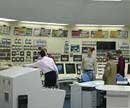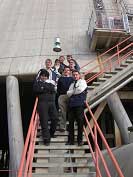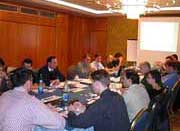 |
 |
Issue No.4 Spring
|
| Editorial: UK study |
| ENS News |
|
ENS Vienna General Assembly
|
| ENS Events |
|
|
| Member Societies & Corporate Members |
| 5-6 May
Slovakian conference
|
| European Institutions |
| Council of the European Union 'Nuclear package'
Euratom loan: Cernavoda-2
|
| ENS World News |
|
NucNet news |
  |
| _____________________ |
| _____________________ |
| |
||||||||||||||||||||
 José Luis Perez |
For the first time, Spain
was the location for the ENS’s Young Generation Network
(YGN) Board Meeting, which coincided with the start of the
ENS nuclear communicators’ conference, PIME 2004,
in Barcelona on 8 March. Hospitality was the watchword for
members of ‘Jóvenes Nucleares’, the Spanish
Nuclear Society’s (SNE’s) Nuclear Young Generation
Committee, who took on the lion’s share of all the
work involved in organising both the meeting and the technical
visit on the preceding Saturday. |
Thirteen of 17 European countries
were represented at the Board Meeting, of which there are
routinely three held annually. Generally, these meetings
are devoted to deciding on, organising and monitoring YGN
activities – both nationally and internationally –
in the pursuit of the universal YGN goals. |
 Manuel Martin |
-
effecting a transfer of knowledge between the older and the young generation in the nuclear field, in the interests of turning out well-trained professionals equipped to satisfy current and future needs;
-
encouraging young people to have an interest in nuclear technology, and to consider it as a career; and
-
promoting exchanges of experience among young nuclear professionals from different European countries.
At the 8 February meeting, held at the same hotel as PIME,
the YGN representatives evaluated their networks’ activities
carried out since their last meeting, which had taken place in
Vienna in 2003. As is customary at all YGN Board Meetings, representatives
from each of the countries were, in turn, tasked with briefly
summarising their respective country’s report. The latest
of these reports (from 8 February) – providing track records
of each national YGN’s activities over a specified period
– can be viewed on, and downloaded from, the ENS website:
http://www.euronuclear.org/aboutus/yg/country-reports.htm.
Fittingly, as Spain was the host country, Jóvenes Nucleares got the ball rolling, explaining the impetus it has given to its activities, through its organisational structure. The Spanish representative emphasised the key activities carried out last year as well as those planned for future programmes. Highlights from 2003 were conferences, participation in the technical committee for the Spanish Nuclear Society’s (SNE’s) Annual Meeting and the impulse given to boosting young generation membership. Jóvenes Nucleares’ various future programmes will focus on: further conferences in high schools and universities; updating its website; creating and maintaining its database of all its members; and being actively involved in the SNE’s activities, with emphasis on the Annual Meeting.
Following the presentations of the country reports, discussion at the Board Meeting moved on to the ENS YGN’s participation in different activities related to nuclear energy – such as PIME, the ENS General Assembly in Vienna on 25 June, and the third biennial International Youth Nuclear Congress (IYNC) in Toronto on 9-13 May 2004.
Lunch in a nearby restaurant was swiftly proceeded by a shift in the meeting’s focus, to internal matters. And, although full, the afternoon’s programme included a brief but illuminating presentation by Sami Tulonen of the European Atomic Forum, FORATOM, branch of the ENS’s joint secretariat. Sami spoke on FORATOM’s actions in the European Commission, stressing the importance of some of the Eastern European countries’ imminent integration into the European Union (EU), taking into account their operation of nuclear power plants (NPPs).
Hospitalet de I’Infant and Ascó Nuclear Power Station technical visit
 |
The first stop of the Saturday, 7 February YGN technical visit was Hospitalet de I’ Infant. Here, the group met their hospitable and enthusiastic host, James Ferrús, a member of the communication team in the Ascó-Vandellós centres. Mr Ferrús conducted their visit to the Tecnatom-owned simulators for the Ascó I & II and Vandellós power stations. The simulators provide an essential means for training the operators who work in these power stations, as they simulate perfectly the real working environment in the control rooms. |
|
|
With unflagging dedication, Mr Ferrús then led the group on a tour of the whole building, which Tecnatom devotes to providing training services. It is this availability of facilities that contributes to the fact that the Ascó and Vandellós Centres are equipped with highly qualified operative, maintenance and engineering staff, as well as sound technical support. |
| Next on the programme was Ascó NPP, which is run by companies belonging to the Endesa Group and Iberdrola. There, the group made their way to the visitors’ centre, which has received some 80.000 visitors. |
 |
Afterwards, while continuing to be guided by Mr Ferrús, they visited the huge cooling tower located near the banks of the Ebro River, which is surrounded by scenic landscape. By all reports, when inside the tower, the members of the group’s general consensus was that they were sure that their echoing questions emulated the steam produced by the concrete giant when it is in operation. |
 |
|
||
Lacking the time to visit Vandellós NPP, the group set off back to Barcelona since a lot of work awaited them during the Board Meeting the next day. |
 |
|
Spanish YGN calls on young nuclear professionals to join
Of the Spanish YGN’s organisational role in the two-day events and its participation in the meeting’s debates, Jóvenes Nucleares chair, Isabel Gomez says: “We have proved our capacity to successfully organise an international event, and we hope that we have shown our commitment to being active members of the European Young Generation.
 |
|
“For these reasons, among others, we invite all young professionals working in any field concerning nuclear science and technology in Spain – nuclear power plants, laboratories, universities, regulatory bodies, engineering or electrical companies – to join the Spanish YGN. By doing so, they will be part of an organisation which believes that nuclear science and technology contribute to the development and welfare of our society,” says Isabel.

International Youth Nuclear Congress (IYNC)
IYNC – the next of which is in Toronto on 9-13 May 2004 – is a project of the utmost importance to the ENS YGN, which participates in its organisation as well as taking an active role in its development. Bringing together young nuclear professionals from all over the world, this biennial congress has as its aim the creation of a meeting point for sharing knowledge, experience and new ideas. (Please see our announcement of Toronto IYNC2004 in the issue of ENS News.)
ENS YGN is in favour of the next IYNC in 2006 being held in Europe. One of the objectives of the second part of this ENS YGN meeting in Barcelona was to choose a European candidate to bid for hosting the 2006 congress. Two possible candidates were presented, and one of them was chosen after voting.
The official bid to host IYNC2006 was announced to IYNC Network representatives a bit later. (It was still a secret at the time that this issue of ENS News went to press.) Bids will compete on the strength of the different proposals and the final decision will be taken at IYNC2004 in Toronto.
| |





